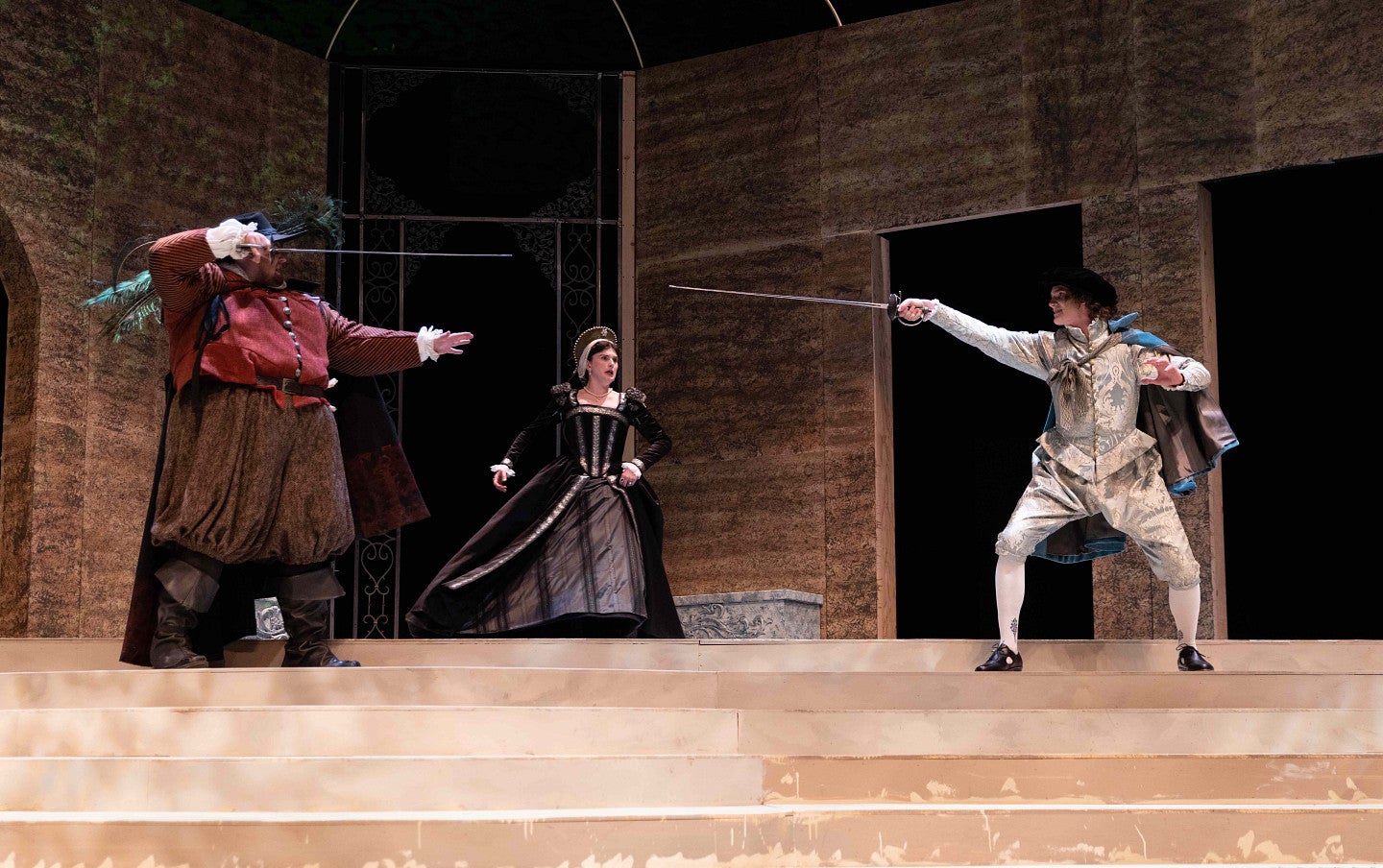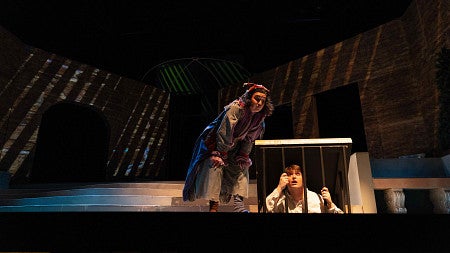
The University Theater ends its 2022-23 season with Twelfth Night, one of William Shakespeare’s most revered comedies.
The play starts with a shipwreck separating twins, each believing the other to have died, and leads to disguises, a love triangle and, of course, Shakespearean dirty puns.
Although written more than 400 years ago, Shakespeare’s Twelfth Night has themes that still ring true.
“What makes the comedy work is that it is grounded in the very need for comedy in the first place,” John Schmor said. Schmor directed the play and is an associate professor in Theatre Arts, a part of the University of Oregon’s College of Arts and Sciences. “We need to laugh, pull pranks, make jokes, sing rowdy songs despite the griefs and losses of living every day.”
The University Theatre’s production opens 7:30 p.m. Friday, May 5, and runs 7:30 p.m. May 12, 13, 19 and 20, and 2 p.m. May 14, in the Robinson Theater. Tickets are available at the box office, UO Ticket Office and online; UO students can attend for free.
Twelfth Night has been adapted quite a bit, and some audiences may even recognize the play from She’s the Man, a 2006 teenage romcom. What is it about this Shakespeare play that makes it relatable?
I think Twelfth Night is remarkably modern in its criticism of puritanical hypocrisy, its understanding of gender as a performative category, and its recognition of fluid identity—including but not limited to non-binary sexuality.
For the first time, I’ve deliberately chosen to “place” the show in an Elizabethan style—with costumes and music especially. I think it’s important to look back and see how people were laughing and struggling with many of the same questions of human interaction that we encounter today.

How does the University Theater approach Twelfth Night in a way that is understandable for audiences today while staying true to Shakespeare’s work?
I’ve cut the script down a bit so the running time is shorter, and have, in a few places, swapped contemporary words for antiquated ones that might slow down how the audience follows the text. But it’s still very much Shakespeare.
The actors and I have worked hard to make the language come alive, to honor where characters are speaking in verse or prose, and to learn how to make sense of what I call “Shakespeare's U-turns,” places where the poetry and emotional intentions take a quick and surprising shift.
Music is a part of Twelfth Night, and music theory doctoral student Blaire Ziegenhagel composed – and will perform — music for the production. How does Blaire’s music fit with the production?
Blaire was a student in one of my acting classes and proposed writing music for this show back in the fall—but I didn’t know how sensitive to a “period” sound and feel she’d come. Songs are integral to the play. All the lyrics you hear in this production are Shakespeare’s.
Blaire’s music is also part of the play in other ways, like underscoring some actions and transiting us into and out of the world of the play. Her truly beautiful work gives us both the spirit and the atmosphere of a time long ago and helps to energize the forward-motions of the action. As the play famously says in one of its opening monologues: “If music be the food of love, play on!”
For some who aren’t familiar with Shakespeare, they may have thoughts of tragedies Romeo and Juliet, the famous monologue from Hamlet or King Lear. How would you describe Twelfth Night for someone who feels too intimidated by Shakespeare as serious theater?
I believe Twelfth Night is one of Shakespeare’s best because it somehow allows for comedy without ignoring that life isn’t purely comedy or tragedy, but a mix of light and dark. The emphasis is on comedy of course: having fun, making rude jokes, playing tricks, mistakenly falling in love—but there’s also some sadness and even mean-ness in its “world.”
Coming to a Shakespeare play shouldn’t feel intimidating—his plays and poems are among the least pretentious, most generous, and compassionate, ever written. But it does require a different kind of listening sometimes. Shakespeare’s world was awash with new words and all kinds of fun with words—so if you can keep up with the language, with characters who love words, people unafraid of lyrical poetry or dirty puns, you’ll be fine.
—By Henry Houston, College of Arts and Sciences
